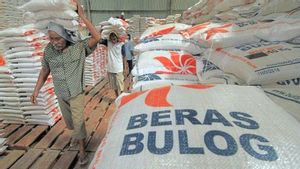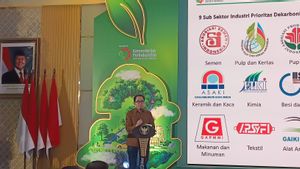JAKARTA - Senior Economist Didik J Rachbini assesses that the surprising attack from Iran in response to Israel shocked the world and at the same time increased the escalation of the conflict in the Middle East will have a broad impact on the national and global economy, which absolutely must be anticipated with policy.
According to Didik, further escalation is still uncertain, but there are almost no mitigating factors at all, so it is unlikely that it will stop soon. Therefore, anticipated mitigation policies need to be formulated and implemented under tense environmental conditions.
Didik said that this condition was risky for the government of the elected president. The reason is, this uncertain condition can and will create chaos in implementing economic policies and at the same time add new burdens to society.
"The target of high economic growth is also wishful thinking in the campaign, forget it, focus on people's resilience, their purchasing power, preventing large unemployment from occurring," he explained in his statement, Thursday, April 18.
Therefore, Didik said that the policy of maintaining inflation and prices of basic necessities is the main policy to protect the vulnerable lower classes.
Didik said that there are 3 policies that must be prioritized to safeguard and protect the lower and vulnerable groups.
The first policy is to ensure purchasing power does not fall, the government must do its best and have all the ability to control prices or maintain inflation. This is a duet between the government and Bank Indonesia.
In this policy, according to Didik, Bank Indonesia plays an important role in controlling the monetary side.
"So far BI has been quite good at implementing inflation control and has carried it out even harder at a time when the world is under increasing tension," he explained.
Furthermore, on the real sector side, the central and regional governments are obliged to monitor the prices of people's basic needs in real-time.
Then, the second policy is fiscal, the only policy instrument that can be directly used by the government. This policy is maintained so that expenditure is productive, able to help lower and vulnerable communities.
Didik said that good fiscal policy is prudent, careful and able to control the deficit, don't overdo it, control big projects, and don't be careless in populism.
Meanwhile, Didik conveyed the final policy, namely to maintain productivity and the business world in the country.
"It must be remembered that the domestic sector is the largest part, namely 75 percent. Even though external shocks have occurred, maintaining the domestic economy and businesses, especially medium and small businesses, is very important in critical times," he said.
SEE ALSO:
According to Didik, foreign trade policy is directed towards areas that are least affected by war. Routes to Europe and the Middle East will definitely be disrupted.
"But trading partners at other economic poles will continue to live, such as partners in Japan, China, ASEAN, India, etc.," he said.
According to Didik, the weakening of the rupiah has had a psychological impact and this has already been felt in society. Therefore, the government needs public communications experts who understand society.
"Especially the prospective new government will start now to carry out public communication policies related to anticipating policies regarding the impact of the Iran-Israel war," he concluded.
The English, Chinese, Japanese, Arabic, and French versions are automatically generated by the AI. So there may still be inaccuracies in translating, please always see Indonesian as our main language. (system supported by DigitalSiber.id)
















